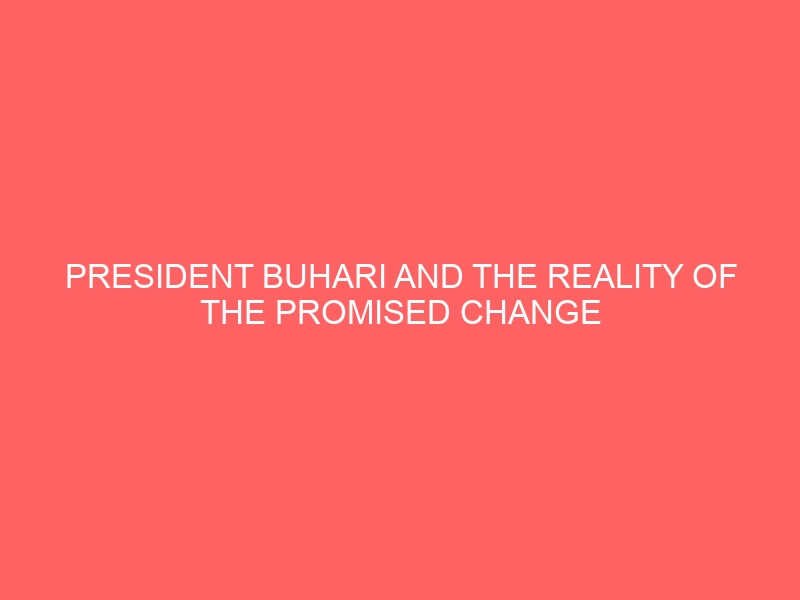If one considers the more obvious indices of the rising costs of food, energy and transportation; alongside the largely receded minimum wage, huge unemployment figures in the country, the increasing immiseration of the people, and an environment still basically unfriendly to businesses – leading to the continuous shut down of small and medium scale enterprises — then it would be easy to assume that in its first year, the Buhari administration has performed way below the bar it set for itself in seeking office.
Also, in contemplating an economy in a tailspin, rapidly contracting and inspiring further grim forecasts on the continued decline of national productivity, and the ongoing direct march towards a recession, it would equally not be difficult to declare the first anniversary of the Buhari administration as having run contrary to the promise of change it committed to delivering in its manifesto and at the inception of the regime.
There are however other indicators and an alternative perspective that provides a justification for the complex state of affairs the country is in. The current fiscal crises and massive decline in revenue in the country is due to the dual challenges of the fall of the price of oil and dramatic decline in quantity available for export due to the recent escalation of the Niger Delta militancy. The resources available for social provisioning are simply not available.
The Buhari regime also inherited a system polarized by a gale of mega looting of available resources.Yet, a more realistic depiction of the administration’s fortunes lies somewhere in between these polar perspectives.
This heavily nuanced space, however, resonates with the administration’s failure to articulate a structured and coherent economic recovery and development strategy, involving policies and programmes seeking to take Nigeria out of its present quagmire and movement towards economic revival. We cannot accept the bandying around of platitudes.
The government has spoken repeatedly about the imperative of diversifying the economy following the boom and bust of the commodity cycle. There is however no clear road map and convincing strategy document that is available to demonstrate that it knows how to handle the economy. Of course the unfortunate and sudden resurgence of militancy and sabotage of oil and gas pipelines in the Niger Delta is a real problem.
Nevertheless, it has been eventful since the Buhari administration took on the reins of government. The regime was welcomed with a significantly high level of confidence in government and an expectation of a return to genuine and purposeful public service. Nigerians remain convinced that there have been significant gains over the last year in the war against corruption and in combatting the Boko Haram insurgency. The result appears to be a gradual restoration of public trust in government and governance.
In the past, the erosion of confidence in the governance team had created apathy and/or revolt. Now, there is a newer inclination not to see government (mainly the federal executive) as a deliberate buccaneer of the common wealth, despite lingering outrage at the appetite of members of the National Assembly for obscene luxury and emoluments in a lean time, and also the malfeasance of budget padding on the part of civil servants.
No doubt, gains have been made in the reformation of public sector finances, through the Treasury Single Account (TSA), which has restrained the usual fritter of government resources, and the efforts at ghost-busting in the work force, cleaning up the federal payroll of ghost workers, leading to considerable savings of up to N185 billion.
Attestation to a growing climate of public trust was recently manifested in the lukewarm response of Nigerians to the call for strike over the increase in petrol price by organised labour. Also, notable in this wise was the general tepidness of reactions following the quiet ‘official devaluation’ of the Naira and adoption of a flexible regime of foreign exchange rates, which otherwise could have signaled protests within certain sections of the public.
Beyond the deeply divided ratings of the federal government’s performance across sections of the Nigerian society, it is without doubt that there are noteworthy concerns pervading the country. Electricity has dropped to possibly its lowest generation of about 1,580 MW in decades – from an all-time high of 5,000 MW in the weeks before the president’s inauguration – making for massive energy shortages. And the persistence and national character of conflicts between nomadic pastoralists and farmers, inter-communal violence and destruction, and armed banditry certainly complicate Nigeria’s fragile security situation.
These have led to attack on what many see as the administration’s brazenly rationalised cop out on its campaign promises, with only one of these – out of 222 – pertaining to President Buhari’s public declaration of personal assets being kept to an extent.
According to Buharimeter, a civil society effort tracking the president’s performance, 184 of these promises are yet to be kept, and 37 are in different stages of being kept.
This makes several people consider the economic justification for the ‘cancellation’ of electoral promises as earning the administration serious credibility deficits, particularly in relation to its promises to completely overhaul government and its finances.
While its scorecard appears a tad grim, the government had, prior to its first anniversary in office, engaged in a feat of chest thumping, declaring 107 achievements, with President Buhari subsequently commending his team for reconstructing the “spine of the Nigerian state”. Still, crucial issues subsist from the unnecessary delays in the setting up of a cabinet, and hence deferral in the proper taking off of government; the lateness in the passing of the 2016 Budget; and the lack of a solid economic team, which could have influenced a more positive set of outcomes.
Even at this point in the life of the administration, what Nigerians keep clamouring for include the articulation of a virile economic strategy that can truly diversify and turn the fortunes of the economy around, secure livelihoods and protect the vulnerable, while offering a leeway to defusing the potential crises evolving with the country’s restless and enlarging youth bulge. Also, there is need for better policy coherence, and vastly improved communication between government and the public, to make the administration truly people-oriented and responsive.
Going forward, some of the essential paradoxes haunting the administration would start to resolve more positively if the administration can pull its economic act together, while quickly and diligently executing the president’s proclaimed anniversary inauguration of programmes including a N500 billion social protection fund for the vulnerable.
In addition to this, there is need for a more resolute tackling of the IDP problems arising from the Boko Haram insurgency in North-East Nigeria, fast-tracking the repair of the country’s refineries to ensure fuel availability at more competitive prices. Also, the reduction of the country’s food import bill through more aggressive agricultural interventions in the local cultivation of rice, wheat and sugar.
A genuine dialogue with more seriousness on the part of the government to engage critical stakeholders of the Niger Delta that will truly reflect and appease the interest of the economically dangerous members of Niger Delta Avengers with a view of putting to rest on the rampaging expedition on national assets will no doubt save the country from reviving and repositioning the economy that is steadily declining with a gloomy prospect.
Equally, the genuine implementation of the long overdue cleaning up of the Niger Delta, in line with the recommendation of the United Nations Environment Programme (UNEP) report on the environmental restoration of Ogoni land. And, further saving of government costs through the rationalisations of MDAs for a leaner and more efficient civil service.
Importantly, with the president’s anniversary acknowledgment of the positive and mostly undervalued roles of women in the development of the country this far, the time seems perfect for proper mainstreaming of women’s concerns in national development planning, in ways that are more significant.












